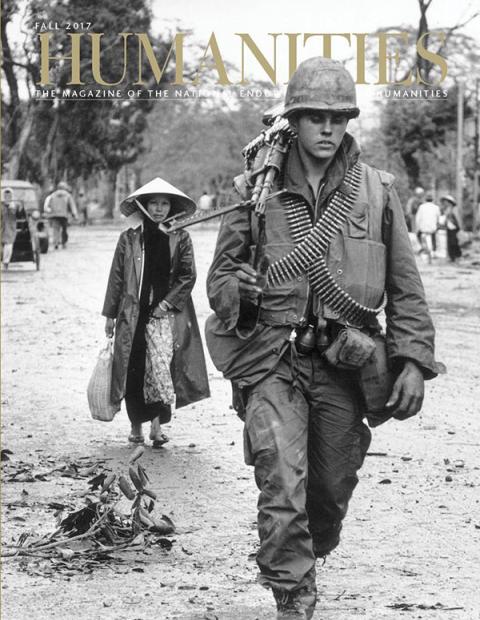As a humanist living in Indiana, you may not have ventured into the local observatory or studied the origins of molecular biology, or sat down with strangers to discuss the multiple dimensions of knowing. But on a Tuesday in May, dozens of people assembled in five cities across the state for an exercise in grassroots humanities intended to share mental space with science and technology.
The program was called “Chew on This: Are You Sure?,” a conversation to “explore questions of validity, reliability, probability, facts, evidence, and truth,” according to the card at each place setting for the 15 assembled at Feast, a locally renowned restaurant in Bloomington. The conversation was moderated by Winni Sullivan and Elaine Monaghan, respectively professors of religious studies and media studies at Indiana University. The discussion distinguished two kinds of knowing: the fact-based, accountable knowing typical of journalism, and the spiritual knowing of religion. “Fake news” was the predominant topic of the journalism discussion. Whether we can know things in our bones without any external confirmation was central to the discussion about religious truth.
Talk was animated. How often do strangers from different walks of life and different generations meet to work through thorny intellectual issues like how we know what we know and the ethics of knowing? It was out of the ordinary, exciting.
While conversations were going on simultaneously in Valparaiso, Fort Wayne, Muncie, and Indianapolis, attendees used technology to extend their discussions beyond their tables—they tweeted amongst themselves. “In Bloomington:” one wrote, “is there a difference between how we know gravity is real and know someone loves us?” Another asked, “What does it mean to ‘feel [truth] in your bones? Is there a kinesthetic facet to truth?”
The event was part of Quantum Leap, a two-year initiative of Indiana Humanities encouraging Hoosiers to explore “the spirit of possibility and problem-solving that occurs when we bridge the humanities with science, technology, engineering, math, and medicine”—in a word, STEM.
Keira Amstutz, president and CEO of Indiana Humanities, observes that “in past eras, STEM and humanities were seen as two sides of a common coin. Today we seem to view them as opposing forces.” Quantum Leap invites Hoosiers to read, think, and talk about the relationship between technical progress—what we can do—and questions about what we should do and why.
Innovation doesn’t “happen in a vacuum, but hand in hand with the humanities,” says Kristen Fuhs Wells, director of communications and development at Indiana Humanities. She says it’s important to show how the humanities are essential to Indiana’s economic and cultural prosperity.
Quantum Leap was launched in April, when INconversation, another of Indiana Humanities’ signature programs, presented an interview with MIT physicist and author Alan Lightman. Other Quantum Leap events included a conversation with Adrian Matejka, prizewinning poet whose new book, Map to the Stars, draws on his childhood ambition to become an astronaut—poetry came later. On October 23, there is another conversation with Jonathan Eller, director of the Center for Ray Bradbury Studies at Indiana University/Purdue University Indianapolis.
In addition to traditional sit-down events, Quantum Leap hosted field trips to the Link Observatory near Mooresville, the Indianapolis Zoo, and the Indiana Dunes this past summer. And, in October, it sponsors a Wikipedia edit-a-thon to give recognition to women’s contributions to STEM research and teaching.
“Frankenfest,” a celebration of Mary Shelley’s enduring novel about the ethics of scientific experimentation, began in September. Events include a “read-a-thon” of the novel at the Indiana Medical History Museum, a statewide series of talks, and exhibits and film festivals at a number of the state’s colleges and universities. In March, DePauw University’s Prindle Center for Ethics will hold an immersive Frankenstein weekend, complete with talks by scholars, performances, and meals inspired by the novel. Community Reads promotes local celebrations of Frankenstein with grant support, Frankenswag, and free copies of the book.
“Sound Bites,” a series of five-minute audio stories about discovery and creation in Indiana, produced by Sandra Bertin, is another Quantum Leap program. The first episode, “The Attic Lab: How did a campus dance and a room full of bunnies in Bloomington, Indiana, lead to one of the twentieth century’s greatest breakthroughs in genetics?” aired on March 14. It describes the life of Nobel laureate S. E. Luria, whose work on bacterial mutation by viruses set the course for modern molecular biology. Luria also was a passionate advocate for the humanities and even taught a world literature course at MIT later in his career. Seventeen podcasts are available so far, with more to come this year and in 2018.
Wells hopes that Quantum Leap will help citizens see Indiana as a place of creation and progress. She reminds young Hoosiers, “You don’t need to go to the coasts to be an innovator.”


